

Surveillance Reports - Health Protection Surveillance Centre. Renal Impairment Summary. Scope of this guidance This guideline and associated dosage adjustment tables is intended for use in the management of community infections only.
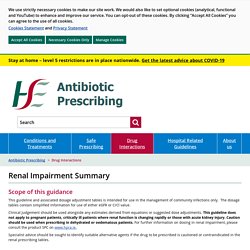
The dosage tables contain simplified information for use of either eGFR or CrCl value. Clinical judgement should be used alongside any estimates derived from equations or suggested dose adjustments. This guideline does not apply to pregnant patients, critically ill patients where renal function is changing rapidly or those with acute kidney injury. Caution should be used when prescribing in dehydrated or oedematous patients. Specialist advice should be sought to identify suitable alternative agents if the drug to be prescribed is cautioned or contraindicated in the renal prescribing tables.
Checking renal function is an important component of antimicrobial stewardship and safe prescribing Several commonly prescribed antimicrobials do require dose adjustment in moderate to severe renal impairment. How to make dose adjustments in renal impairment. CredibleMeds. Liverpool HIV Interactions. Drug Interactions Table. This information on drug interactions with antimicrobials is intended for use as a guide and not as a complete reference source.
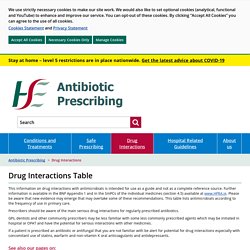
Further information is available in the BNF Appendix 1 and in the SmPCs of the individual medicines (section 4.5) available at www.HPRA.ie. Please be aware that new evidence may emerge that may overtake some of these recommendations. This table lists antimicrobials according to the frequency of use in primary care. Prescribers should be aware of the main serious drug interactions for regularly prescribed antibiotics.
GPs, dentists and other community prescribers may be less familiar with some less commonly prescribed agents which may be initiated in hospital or OPAT and have the potential for serious interactions with other medicines. If a patient is prescribed an antibiotic or antifungal that you are not familiar with be alert for for drug interactions especially with concomitant use of statins, warfarin non-vitamin K oral anticoagulants and antidepressants. Fungal Pharmacology. Liverpool HEP Interactions. Tuberculosis. Tuberculosis (TB) is caused by bacteria (Mycobacterium tuberculosis) that most often affect the lungs.
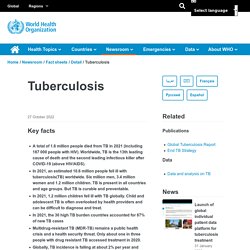
Tuberculosis is curable and preventable. TB is spread from person to person through the air. When people with lung TB cough, sneeze or spit, they propel the TB germs into the air. A person needs to inhale only a few of these germs to become infected. About one-quarter of the world's population has a TB infection, which means people have been infected by TB bacteria but are not (yet) ill with the disease and cannot transmit it. People infected with TB bacteria have a 5–15% lifetime risk of falling ill with TB. When a person develops active TB disease, the symptoms (such as cough, fever, night sweats, or weight loss) may be mild for many months.
Who is most at risk? Tuberculosis mostly affects adults in their most productive years. People who are infected with HIV are 18 times more likely to develop active TB (see TB and HIV section below). Global impact of TB Symptoms and diagnosis. WHO Consolidated Guidelines on Tuberculosis, Module 4: Treatment - Drug-Resistant Tuberculosis Treatment. Overview Background Tuberculosis (TB) strains with drug resistance (DR-TB) are more difficult to treat than drug-susceptible ones, and threaten global progress towards the targets set by the End TB Strategy of the World Health Organization (WHO).
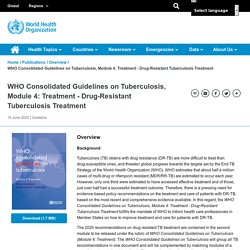
WHO estimates that about half a million cases of multi-drug or rifampicin resistant (MDR/RR-TB) are estimated to occur each year. However, only one third were estimated to have accessed effective treatment and of those, just over half had a successful treatment outcome. Therefore, there is a pressing need for evidence-based policy recommendations on the treatment and care of patients with DR-TB, based on the most recent and comprehensive evidence available.
The 2020 recommendations on drug resistant TB treatment are contained in the second module to be released under the rubric of WHO Consolidated Guidelines on Tuberculosis (Module 4: Treatment). PrEP to prevent HIV - sexualwellbeing.ie. PrEP stands for pre-exposure prophylaxis.
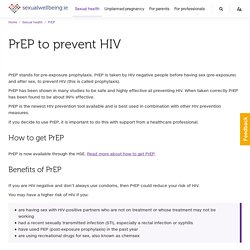
PrEP is taken by HIV negative people before having sex (pre-exposure) and after sex, to prevent HIV (this is called prophylaxis). PrEP has been shown in many studies to be safe and highly effective at preventing HIV. When taken correctly PrEP has been found to be about 99% effective. PrEP is the newest HIV prevention tool available and is best used in combination with other HIV prevention measures.
If you decide to use PrEP, it is important to do this with support from a healthcare professional. National Immunisation Office. Vaccine Knowledge.
Useful Journals.